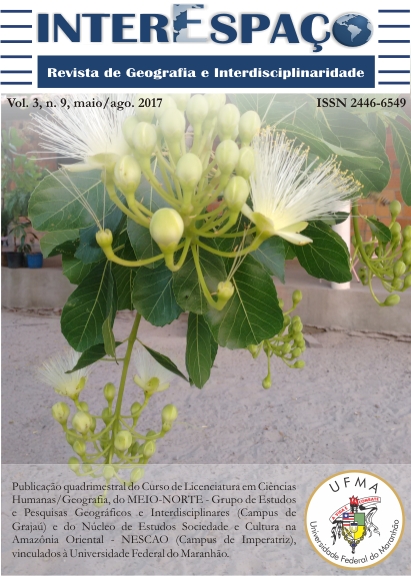DESMATAMENTO, BEM-ESTAR COMUNITÁRIO E O DESENVOLVIMENTO SUSTENTÁVEL: uma análise integrada em São Tomé e Príncipe – África
DOI:
https://doi.org/10.18764/2446-6549.v3n9p109-125Palavras-chave:
Impacto Ambiental, Bem-estar Comunitário, São Tomé e PríncipeResumo
DEFORESTATION, COMMUNITY WELLNESS AND SUSTAINABLE DEVELOPMENT: an integrated analysis in Sao Tome and Principe - Africa
DÉFORESTATION, BIEN-ÊTRE COMMUNAUTAIRE ET DÉVELOPPEMENT DURABLE: une analyse intégrée à Sao Tomé-et- Principe – Afrique
A preocupação com a natureza, frente aos impactos negativos provocados pela ação humana, tem sido objeto de grande reflexão internacional. Vários eventos já foram realizados sobre a matéria, mormente apelando à conservação dos recursos naturais e à necessidade do desenvolvimento sustentável. Entretanto, atrocidades contra a natureza têm defasado fauna e flora em diversos lugares, como é caso de São Tomé e Príncipe. Eis o objeto do presente trabalho: analisa-se a relação socioambiental no país, sobretudo as causas e efeitos da acentuada prática do desmatamento. E para tanto, usou-se uma metodologia centralizada na revisão da literatura complementada com uma análise interpretativa e reflexiva sobre os problemas ambientais. Assim, convém destacar subsídios teóricos usados: Eiffert (2010); Castro et al. (2005); Filho (2000); Rodriguez et al. ( 2009); Souza et al. (2012). Outrossim, diplomas legais que dispõem sobre a matéria foram de capital importância, sobretudo a Constituição da República Democrática de São Tomé e Príncipe 2003 e da Lei n.º 05/2001, Lei de Florestas. No decorrer da análise, constatou-se que o fator desmatamento registrado, em parte, está condicionado ao fator econômico (pobreza), e isso impôs à necessidade da reflexão socioeconômica em conjugação com o fator socioambiental. Por fim, instiga-se a importância de planos estratégicos para uso sustentável de recursos naturais, visando à estabilidade ecológica local. São essas reflexões que deram sustentação e especificidade no desenrolar do presente estudo, o qual se espera ensejar mais reflexões e debates sobre a matéria em epígrafe.
Palavras-chave: Impacto Ambiental; Bem-estar Comunitário; São Tomé e Príncipe.
ABSTRACT
The concern with nature, in the face of the negative impacts caused by human action, has been the object of great international reflection. Several events have already been held on the subject, especially appealing to the conservation of natural resources and the need for sustainable development. However, atrocities against nature have lagged fauna and flora in several places, as is the case of São Tomé and Príncipe. The objective of the present study is to analyze the socio-environmental relationship in the country, especially the causes and effects of the marked deforestation practice. For this purpose, a centralized methodology was used in the review of the literature and complemented with an interpretative and reflexive analysis on the environmental problems. Thus, it is worth mentioning the theoretical subsidies used: Eiffert (2010); Castro et al. (2005); Filho (2000); Rodriguez et al. (2009); Souza et al. (2012). In addition, the legal provisions on this matter were of paramount importance, especially the Constitution of the Democratic Republic of São Tomé and Príncipe 2003 and Law no. 05/2001, Law on Forests. In the course of the analysis, it was found that the recorded deforestation factor, in part, is conditioned to the economic factor (poverty), and this imposed the need for socioeconomic reflection in conjunction with the socio-environmental factor. Finally, the importance of strategic plans for the sustainable use of natural resources is instigated, aiming at the local ecological stability. It is these reflections that gave support and specificity in the course of the present study, which is expected to lead to more reflections and debates on the subject in question.
Keywords: Environmental Impact; Community Well-being; Sao Tome and Principe.
RÉSUMÉ
La préoccupation de la nature, face aux impacts négatifs causés par l'action humaine, a fait l'objet d'une grande réflexion internationale. Plusieurs événements ont déjà eu lieu sur le sujet, en particulier pour la conservation des ressources naturelles et la nécessité d'un développement durable. Cependant, les atrocités contre la nature ont retardé la faune et la flore dans plusieurs endroits, comme c'est le cas à São Tomé et Príncipe. L'objectif de la présente étude est d'analyser les relations socio-environnementales dans le pays, en particulier les causes et les effets de la pratique de la déforestation. À cette fin, une méthodologie centralisée a été utilisée dans l'examen de la littérature et complétée par une analyse interprétative et réflexive des problèmes environnementaux. Ainsi, il convient de mentionner les subventions théoriques utilisées: Eiffert (2010); Castro et al. (2005); Filho (2000); Rodriguez et al. (2009); Souza et al. (2012). En outre, les dispositions légales sur cette question revêtaient une importance primordiale, en particulier la Constitution de la République démocratique de São Tomé et Príncipe de 2003 et la Loi n ° 05/2001, Loi sur les forêts. Au cours de l'analyse, on a constaté que le facteur de déforestation enregistré, en partie, est conditionné au facteur économique (pauvreté), ce qui a imposé la nécessité d'une réflexion socio-économique en conjonction avec le facteur socio-environnemental. Enfin, l'importance des plans stratégiques pour l'utilisation durable des ressources naturelles est instigée, en vue de la stabilité écologique locale. Ce sont ces réflexions qui ont apporté un soutien et une spécificité au cours de la présente étude, ce qui devrait conduire à plus de réflexions et de débats sur le sujet en question.
Mots-clés: Impact Environnemental; Bien-être Communautaire ; Sao Tomé-et-Principe.
Downloads
Downloads
Publicado
Como Citar
Edição
Seção
Licença
Direitos autorais InterEspaço: Revista de Geografia e Interdisciplinaridade
Este obra está licenciado com uma Licença Creative Commons Atribuição-NãoComercial-SemDerivações 4.0 Internacional.
Os conteúdos publicados são de inteira e exclusiva responsabilidade de seus autores, ainda que reservado aos editores o direito de proceder a ajustes textuais e de adequação às normas da publicação.







